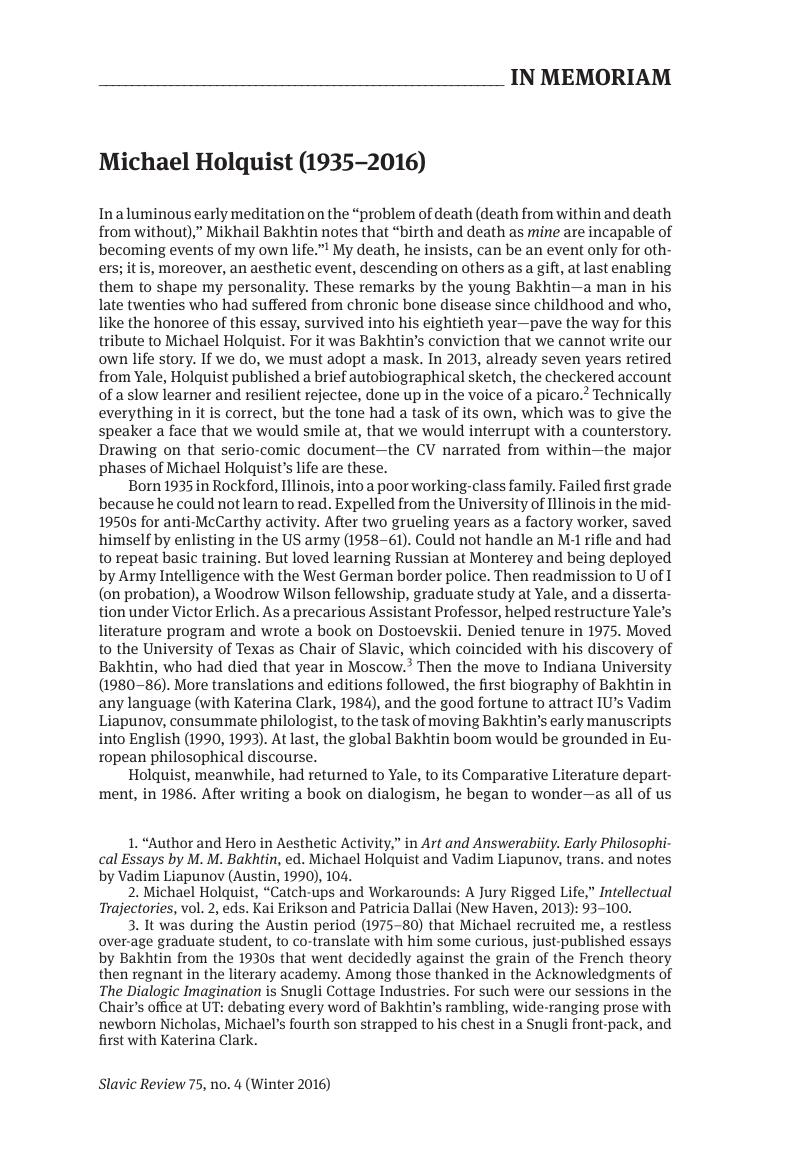Article contents
Michael Holquist (1935–2016)
Published online by Cambridge University Press: 13 March 2017
Abstract

- Type
- In Memoriam
- Information
- Copyright
- Copyright © Association for Slavic, East European, and Eurasian Studies. 2016
References
1. “Author and Hero in Aesthetic Activity,” in Art and Answerabiity. Early Philosophical Essays by M. M. Bakhtin, ed. Holquist, Michael and Liapunov, Vadim, trans. and notes by Liapunov, Vadim (Austin, 1990), 104 Google Scholar.
2. Holquist, Michael, “Catch-ups and Workarounds: A Jury Rigged Life,” Intellectual Trajectories, vol. 2, eds. Erikson, Kai and Dallai, Patricia (New Haven, 2013): 93–100 Google Scholar.
3. It was during the Austin period (1975–80) that Michael recruited me, a restless over-age graduate student, to co-translate with him some curious, just-published essays by Bakhtin from the 1930s that went decidedly against the grain of the French theory then regnant in the literary academy. Among those thanked in the Acknowledgments of The Dialogic Imagination is Snugli Cottage Industries. For such were our sessions in the Chair's offi ce at UT: debating every word of Bakhtin's rambling, wide-ranging prose with newborn Nicholas, Michael's fourth son strapped to his chest in a Snugli front-pack, and fi rst with Katerina Clark.
4. For a masterful survey of the Kantian substrate in Bakhtin, and the most lucid explanation possible of Kant's “transcendental” versus Bakhtin's “transgredient,” see Holquist, Michael, “The Role of Chronotope in Dialog,” in “From Petersburg to Bloomington. Essays in Honor of Nina Perlina,” ed. Bartle, John, Finke, Michael C., Liapunov, Vadim, Indiana Slavic Studies 18, (2012): 65–79 Google Scholar.
5. Holquist, Michael, “Preface,” The Novelness of Bakhtin. Perspectives and Possibilities, ed. Bruhn, Jorgen and Lundquist, Jan (Copenhagen, 2001): 7–9, here 7Google Scholar.
6. Holquist, Michael, “Bakhtin and the Task of Philology. An Essay for Vadim,” in “In Other Words: Studies to Honor Vadim Liapunov,” ed. Blackwell, Stephen, Finke, Michael, Perlina, Nina, and Vernikova, Yekaterina, Indiana Slavic Studies 11, (2000): 55–67, here 56Google Scholar.
7. Ilya Kliger, “Some Themes from Michael Holquist (1935–2016),” NYU Jordan Center for the Advanced Study of Russia, at http://www.jordanrussiacenter.org/news/themes-michaelholquist-1935–2016/#.WA5vhoMrLct (last accessed October 24, 2016).
8. Bakhtin, Mikhail, Bakhtin, Mikhail, Problems of Dostoevsky's Poetics, trans. and ed. Emerson, Caryl (Minneapolis: University of Minnesota Press, 1984), 28 Google Scholar.
9. Holquist, Michael, “Dialogism and Aesthetics,” in Late Soviet Culture From Perestroika to Novostroika, ed. Lahusen, Thomas and Kuperman, Gene (Durham, 1993): 155–76Google Scholar.
10. Holquist, Michael, “World Literature and Philology,” in The Routledge Companion to World Literature, eds. D’haen, Theo, Damrosch, David, Kadir, Djelal (London, 2011): 147–57Google Scholar.
11. “Ideology, the Sacred, and the Novel. Moscow, June, 2015. 20 minutes = 2,600 words.” Located by Ilya Kliger and forwarded to the author several days aft er Holquist's death (June 26, 2016).
12. Khol′kvist, M., “Ideologiia, sakral′noe i roman,” in Literatura i ideologiia. Vek dvadtsatyi, Panova, O. Yu., Tolmachev, V. M., ed. trans. Pirusskaia, T. A. (Moscow, 2016): 9–18 Google Scholar.
13. Bakhtin, “Author and Hero in Aesthetic Activity,” 122.
14. Ibid., 123.
- 2
- Cited by


